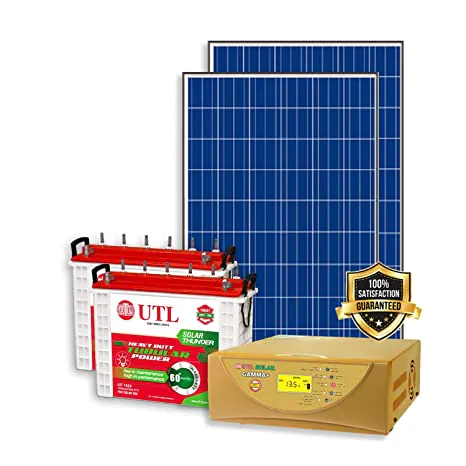Affordable Off-Grid Solar System Price in India
An off-grid solar system, or freestanding or autonomous system, is intended to supply electricity in areas without grid connectivity. These self-contained systems use solar energy to create power for various applications. This section will review an off-grid solar system's features, benefits, and components.

How Does an Off-Grid Home Solar System Work?
Solar panels, a charge controller, batteries, an inverter, and other components make up an off-grid solar system. Here's a quick rundown of how it works:
-
Solar Panels: Photovoltaic (PV) solar panels, typically mounted on rooftops or in open spaces, absorb sunlight and convert it into direct current (DC) electricity. The panels are composed of multiple solar cells made of semiconductor materials.
-
Charge Controller: The charge controller regulates the flow of electricity from the solar panels to the batteries. It ensures that the batteries are charged efficiently and prevents overcharging, which can damage the batteries.
-
Batteries: The DC electricity produced by the solar panels is stored in batteries for later use. The batteries serve as a power reservoir, supplying electricity when sunlight is insufficient, such as during nighttime or cloudy days.
-
Inverter: The DC electricity stored in the batteries must be converted into alternating current (AC) electricity, the standard form of electricity used in homes and businesses. An inverter performs this conversion, allowing the use of AC electrical loads.
-
Electrical Loads: The AC electricity produced by the inverter is used to power electrical devices, appliances, and other loads in the building or system connected to the off-grid solar system.

Benefits of Off-Grid Solar Systems
-
Energy Independence: Off-grid solar systems provide autonomy and energy independence. They enable users to generate their own electricity without relying on the electrical grid, making them suitable for remote locations or areas with unreliable or nonexistent grid access.
-
Environmental Benefits: By utilizing clean and renewable solar energy, off-grid solar systems reduce reliance on fossil fuels, contribute to a greener environment, and mitigate greenhouse gas emissions.
-
Versatility and Mobility: Off-grid solar systems can be easily deployed and adapted to various applications, including remote cabins, RVs, boats, and emergency backup systems. Their mobility allows users to access power in different locations.
-
Backup Power: The battery storage in off-grid solar systems ensures a reliable power supply, even during periods of low or no sunlight. This backup power capability is essential in off-grid scenarios or during grid outages.
Off-Grid Solar Price List
| Solar System Model | Selling Price | Price/Watt |
|---|---|---|
|
Rs.69,699 |
Rs.69.69 |
|
|
Rs.83,199 |
Rs.83.19 |
|
|
Rs.1,61,399 |
Rs.80.69 |
|
|
Rs.2,07,499 |
Rs.69.16 |
|
|
Rs.3,52,199 |
Rs.70.43 |
|
|
6kW Solar System Price |
Rs.4,45,256 |
Rs. 74.20 |
|
7.5kW Solar System Price |
Rs.5,17,999 |
Rs. 69.07 |
|
Rs.6,41,099 |
Rs.64.11 |
Components of an Off-Grid Solar System
-
Solar Panels: The solar panels capture sunlight and convert it into DC electricity.
-
Charge Controller: The charge controller regulates the charging process of the batteries, preventing overcharging and optimizing battery lifespan.
-
Batteries: The batteries store the DC electricity generated by the solar panels for later use.
-
Inverter: The inverter converts the DC electricity from the batteries into AC electricity for powering electrical loads.
-
Electrical Wiring and Switchgear: Electrical wiring connects the solar panels, charge controller, batteries, inverter, and electrical loads. Switchgear allows for the safe and efficient control of electrical power within the system.
